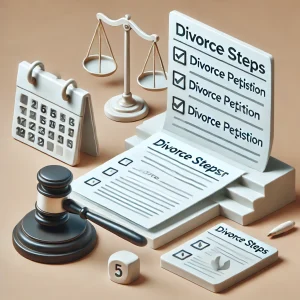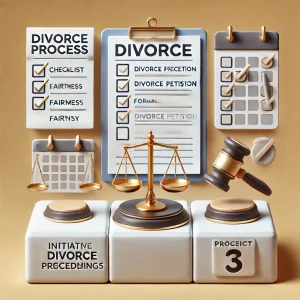How To Initiate A Divorce Procedure | Want to divorce and have questions about divorce proceedings? The questions usually arise after one or both spouses have made a decision to divorce – it matters a lot who submits the dispute resolution application first and where.
How to initiate a divorce proceeding is a question that usually arises after one or both spouses have made a decision to divorce. The divorce process is not a simple process, neither for the divorcing parties nor for their families.
Therefore, when a person is facing divorce proceedings the thoughts are numerous: What will happen to the children? What will the family members say? Will the economic situation deteriorate? And many more questions and concerns. So what about the practical questions? How do you start a divorce proceeding? How do you open a case or file a lawsuit? Where should I go – to the rabbinical court or the family court? We will try to answer these questions in this article.

When one party to the marriage system wants to end his marriage, even before he turns to his partner and tells them what is on his or her mind – it is highly recommended to contact a lawyer who deals exclusively with family law. Advice in this type of procedure is very important, as the procedure itself is complex and meaningful. Many matters are at stake, including the affairs of the children and the common property. It is not advisable to approach divorce proceedings alone. In a consultation meeting with a divorce lawyer, questions will be asked and the case will be told in detail and after understanding the case and knowing the “parties”, a strategic plan will be built during which you will outline the milestones and stages in the divorce process.
What to say (more important – what not to say), when, to whom, what is the decision in identical cases (it is important to understand that there is no rule of thumb – each case on its own), what to expect, how to prepare and more and more. Any divorce proceeding will be opened when the divorce case is opened in the Family Court or the Rabbinical Court. Where should I file for divorce? The question is complex and varies according to the circumstances of each case. In general, it can be said that the rabbinical court usually operates according to Halakhah and its rulings are based on religious law and civil law, while the family court is more “open” to new laws and precedents than civil law. Also, often in divorce in the rabbinate, the rabbinical court deals with the question “who is to blame” for the dissolution of the marriage, and if it is discovered that the marriage fell apart through the woman’s fault, for example if she was unfaithful, it may deprive her of alimony, “Ktubah” and addition to it. It can be said that if we take two completely similar cases, when one will be heard in the family court and the other will be heard in the rabbinical court – we will reach two different rulings. A divorce lawyer, who knows the differences between the various courts, will know the story of the case in detail and will be able to match the case to the court (it is clear that sometimes, in similar cases, similar results can be reached in the family court and the rabbinical court).
So how do you start a divorce process? In opening a divorce case. The institution in Israel that is authorized to marry or expel is the Rabbinical Court, and solely it. According to the clause of 1 of the Rabbinical Courts (Marriage and Divorce) Judgment Law, 1953: “Marriage and divorce matters of Jews in Israel, the citizens or residents of the state shall be under the exclusive jurisdiction of rabbinical courts.” Therefore, divorce will be possible only in the rabbinical court. Today, following the law for the settlement of litigation in family disputes, a dispute resolution procedure must be initiated before the divorce action is opened. And what about alimony, division of property and custody? Things that are involved in their nature and nature – will be discussed in the rabbis, such as: child custody. Things that are not inherently tied – for example child education, child support, property – must be attached in practice, that is, to include explicitly in the claim the law suits that accompanies the divorce claim which must be explicitly stated in the claim.
Divorce costs are pre-determined costs that are updated from time to time. If the spouse, who wishes to divorce, has financial shortage for one reason or another, when filing the claim he must file another request for a fee exemption. This request will be accompanied by documents attesting to the financial situation of the person. In the case of a consensual divorce, the costs are low and an agreed application can be submitted to the rabbinical court, preferably, of course, with a comprehensive divorce agreement, and then there is also no need for a dispute resolution procedure. When the divorce is not consensual, the fees are higher and vary, the more complex the case and includes more details – the higher the fee will be. For example, a divorce claim fee alone will cost hundreds of NIS, but a complex divorce claim, which includes division of property, foreclosures, etc., can exceed the total of NIS 1,000 for opening the case. There are also other lawsuits in the court, such as a “rebellion lawsuit” and a “request for peace making” each of which will cost the couple several hundred shekels. In addition, there are assistance units that include social workers, psychologists, mediators, etc., to whom the couple can turn when they are interested in resolving the conflict or family crisis through dialogue and cooperation. Today, it is a mandatory procedure before filing for divorce.

A divorce process is a procedure whose start date is known, but its end is unknown. Another way the couple can divorce, and it is much quicker is by drafting a divorce agreement with an attorney mediator. The parties can apply for mediation, which is a more pleasant and friendly procedure than a divorce proceeding within the walls of the court. The parties can apply for this procedure alone or be equipped with the representation of a lawyer who will protect the client’s interests throughout the procedure in the mediation procedure. The couple can formulate a divorce agreement that will reflect all the desires and disputes that interfere with them, and after signing the agreement, go to the court or the family court which will give it the validity as a judgment. There is an obligation to approve a divorce agreement in the Family Court or in the Rabbinical Court.
Divorce proceedings are not simple, but it become even more complex when children are involved, especially if the children suffer from emotional and / or physical problems. When there are children the couple might want to divorce as soon as possible, in order to save unnecessary harm to the children. In such situation, it is more desirable than ever to try and divorce through mediation. Mediation is a much friendlier, more pleasant and faster procedure than through the courts proceedings, and a couple who has managed to formulate a divorce agreement that reflects their desires, can save themselves a lot of time, resources and energies. Even if the couple has chosen to divorce through mediation, it is highly advisable to be accompanied by a lawyer who specializes in family law, because the mediation procedure can also end in a way that does not benefit the parties if conducted unaccompanied. A knowledgeable family lawyer knows how to present the client’s desires and how to achieve the best outcome for the client and for the benefit of the joint children.